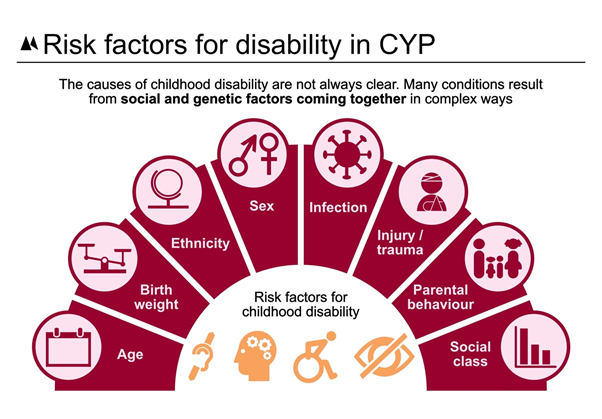
Ensuring that all children and young people (CYP) in London have the best start in life and develop to their full potential is a priority for Public Health England (PHE).
Evidence has shown that enabling children to be physically and emotionally healthy provides the cornerstone for a healthy, productive childhood and adulthood. It is particularly important to help CYP who have a disability to function to the best of their ability.
PHE London has published a report, Disabilities in children and young people in London, aimed at supporting healthcare professionals and commissioners. The report summarises the facts about disabilities in CYP in London, which can help support organisations in commissioning decisions to optimise the life chances of CYP with disabilities and improve their quality of life.
There are a range of risk factors for disabilities in CYP (summarised below) which include the sex of a child, injury or trauma and birth weight. Helping to inform services and healthcare professionals about these can create opportunities for early intervention and in some cases prevention.

Prevention of disabilities in CYP is important, and key elements of a primary preventive approach include:
- Reducing socio-economic disadvantage, exposure to smoking and exposure to environmental hazards
- Improving material environments and immunisation uptake (improving immunisation uptake is one of PHE London’s five priority areas of work)
- Safe alcohol consumption in pregnancy
- Adequate dietary intake of key nutrients
To address some of the risk factors for disability in CYP, PHE London is working closely with NHS England to improve maternity services across London, which is an area which can help improve outcomes for new-born babies.
By working with commissioners and healthcare professionals we can raise the profile of the needs of CYP with disabilities in London and help to ensure they get the right support early. This will help meet their needs and can generate cost savings. For example, for every £1 spent on:
- Enhanced speech and language therapy returns £6.43
- Enhanced speech and language therapy in children with autism returns £1.46
- High-tech augmentative and alternate communication returns £1.23 for children with cerebral palsy and £1.79 for children with autism
Ensuring that all CYP who have a disability are supported to reach their full potential in education and in the community is vital to help them to achieve what matters to them.
However, CYP who have a disability are more likely to experience inequalities; they are more likely to live in poverty, to have fewer educational qualifications, to be unemployed, to experience delays in receiving timely, effective and appropriate healthcare, to have poorer health outcomes and to experience prejudice and abuse. Examples include:
- Two in five disabled children in the UK live in poverty, in London that is around 51,000 children
- The annual cost of bringing up a disabled child is three times higher than that of a non-disabled child
- Four in five children with a learning disability are bullied
- 17% of families with disabled children go without food
- 21% of families with disabled children go without heating
The Mayor of London recently published a draft Health Inequalities Strategy. Better Health for all Londoners aims to tackle the city’s inequalities and improve the health of everyone living in the capital.
One of the five strands in the report addresses healthy children and looks to ensure all of London’s children have healthy places in which to learn, play and develop, and give all young people the best start in life. This is important for both children with and children without disability.
Through continued work with our partners and stakeholders, PHE is helping to ensure that the right support is available for CYP with disabilities and that early intervention can take place. For example, PHE is supporting the work of the Healthy London Partnership to develop a learning disabilities toolkit for CYP with learning disabilities who need elective surgery.
Commissioners can use this report as a resource, which provides facts about key disabilities in CYP in London, including epidemiology, risk factors, costs, impact and support along with using the evidence when developing services to meet the needs CYP with disabilities and their families.
PHE will continue to work with partners to optimise the quality of life of CYP with disabilities and to ensure services meet their needs.
Read other blogs from our London region here.
